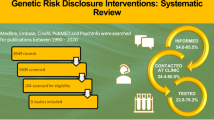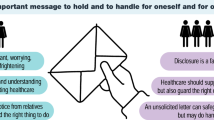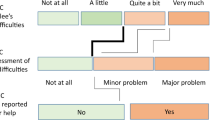Abstract
Women with a family history of breast cancer dominate referrals for cancer genetic risk counselling across Europe. Given limited health care resources, managing this demand, while achieving good value for money for health services, is a major challenge. The paper reports the benefits and associated costs of moving from a traditional system of deriving family history of cancer during the patient's initial clinic attendance, to a protocol-driven system with pre-counselling assessment of family history. The evaluation was based on retrospective clinical data and a clinical audit. Changes in risk between referral and final risk assessment were ascertained and the cost difference between the two systems estimated. The study results showed that 14% of women assessed as ‘low’ genetic risk at referral were reassessed as ‘moderate’ or ‘high’ genetic risk for breast cancer following verification of family history. Sixteen per cent of those assessed as ‘moderate’ or ‘high’ genetic risk at referral were reassessed as ‘low’ genetic risk for breast cancer. Compared to the traditional system, the new protocol-driven system of risk assessment was more consistent, which reduced the number of return appointments and created time for clinicians to spend with other patients. The estimated cost of family history verification and genetic clinic appointment was calculated as £91.68 (€132.53) per family history, compared to £104.00 (€150.34) for the traditional system, representing a slight reduction in health service costs. Finally, the protocol-driven system can be used as part of ongoing audit for planning future genetics services in Scotland.
Similar content being viewed by others
Log in or create a free account to read this content
Gain free access to this article, as well as selected content from this journal and more on nature.com
or
References
Tyczynski JE, Bray F, Maxwell Parkin D : Breast Cancer in Europe. ENCR Cancer Fact Sheets, vol. 2, 2002.
Claus EB, Risch N, Thompson WD : Autosomal dominant inheritance of early-onset breast cancer. Implications for risk prediction. Cancer 1994; 73: 643–651.
Antoniou A, Pharoah PDP, Narod S et al: Average risks of breast and ovarian cancer associated with BRCA1 or BRCA2 mutations detected in case series unselected for family history: a combined analysis of 22 studies. Am J Hum Genet 2003; 72: 1117–1130.
Thompson D, Easton DF, The Breast Cancer Linkage Consortium: Cancer incidence in BRCA1 mutation carriers. J Natl Cancer Inst 2002; 94: 1358–1365.
Ford D, Easton DF, Stratton M et al: Genetic heterogeneity and penetrance analysis of the BRCA1 and BRCA2 genes in breast cancer families. Am J Hum Genet 1998; 62: 676–689.
Fry A, Cull A, Appleton S et al: A randomised controlled trial of breast cancer genetics services in South East Scotland: psychological impact. Br J Cancer 2003; 89: 653–659.
Torrance N, Mollison J, Wordsworth S et al: Genetic nurse counsellors can be an acceptable and cost-effective alternative to clinical geneticists for breast cancer risk genetic counseling. Evidence from two parallel randomised controlled equivalence trials. Br J Cancer 2006; 95: 435–444.
Douglas FS, O'Dair LC, Robinson M, Evans DG, Lynch SA : The accuracy of diagnoses as reported in families with cancer: a retrospective study. J Med Genet 1999; 36: 309–312.
Hopwood P, Wonderling D, Watson M et al: A randomised comparison of UK genetic risk counselling services for familial cancer: psychosocial outcomes. Br J Cancer 2004; 91: 884–892.
Henriksson K, Olson H, Kristoferson U : The need for oncogenetic counseling. Ten years' experience of a regional oncogenetic clinic. Acta Oncol 2004; 43: 637–649.
Steel M, Smyth E, Vasen H et al: Ethical, Social and economic issues in familial breast cancer: a compilation of views from the E.C. Biomed 11 Demonstration Project. Dis Markers 1999; 15: 125–131.
Kinmonth AL, Reinhard J, Bobrow M, Pauker S : The new genetics. Implications for clinical services in Britain and the United States. BMJ 1998; 316: 767–770.
Drummond MF, O'Brien B, Stoddart GL, Torrance G : Methods for the Economic Evaluation of Health Care Programmes. Oxford: Oxford University Press, 1997.
National Institute for Health Clinical Excellence: Appraisal of new and existing technologies: interim guidance for manufacturers and sponsors, 2004.
Aitken J, Bain C, Ward M, Siskind V, Maclennan R : How accurate is self-reported family history of colorectal cancer? Am J Epidemiol 1995; 141: 863–871.
Sijmons RH, Boonstra AE, Reefhuis J et al: Accuracy of family history of cancer: clinical genetic implications. Eur J Hum Genet 2000; 8: 181–186.
Acknowledgements
The Department of Medical Genetics is funded by NHS Grampian. Sarah Wordsworth is funded by a Department of Health Fellowship Award. We thank Pat Yudkin (University of Oxford) for statistical advice. The views expressed in this paper are those of the authors and are not attributable to the funding body.
Author information
Authors and Affiliations
Corresponding author
Rights and permissions
About this article
Cite this article
Gregory, H., Wordsworth, S., Gibbons, B. et al. Risk estimation for familial breast cancer: improving the system of counselling. Eur J Hum Genet 15, 1139–1144 (2007). https://doi.org/10.1038/sj.ejhg.5201895
Received:
Revised:
Accepted:
Published:
Issue date:
DOI: https://doi.org/10.1038/sj.ejhg.5201895
Keywords
This article is cited by
-
The use of genealogy databases for risk assessment in genetic health service: a systematic review
Journal of Community Genetics (2013)
-
A study of the practice of individual genetic counsellors and genetic nurses in Europe
Journal of Community Genetics (2013)



